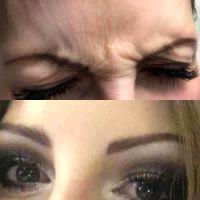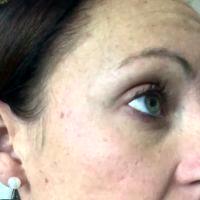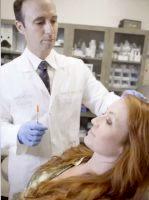How Soon Can You Fly After Botox?
Flying and Botox
There is no issue as far as Botox treatments and flying (whether as passenger or pilot ;).
Generally speaking we advise no rubbing the treated area or laying down flat for 4 hours after your Botox.
Air pressure or elevation should not be of any concern. (Benjamin Barankin, MD, FRCPC, Toronto Dermatologic Surgeon)
Can you fly on the same day as Botox or Dysport treatment? Absolutely.
This is commonly done and I don’t see any difference between flying out of town and getting in your car to drive back home.
Feel free to fly back home and take off for vacation on the same day as your neuromodulator treatment. (Stephen Weber, MD, FACS, Denver Facial Plastic Surgeon)

Avoid Any Flying For At Least 48 Hours After Any Botox Procedure
Flying after Botox or other procedures
Flying after procedures can sometimes be fine but in other situations may be problematic. The changes that occur with flying which can be of concern are changes in air pressure and very low humidity. Flying after botulinum toxin injections, vascular laser treatments, noninvasive skin tightening (Thermage or Ulthera) is not a problem.
Flying after most filler injections (Restylane, Juvederm) should also not pose a problem. Flying within the first week after surgery can be a problem at times as it may predispose to bleeding or increased swelling.
Flying after skin resurfacing isn’t usually a problem but be prepared to use extra moisturizer on a long trip as the air in planes is so dry. (Brian Biesman, MD, Nashville Oculoplastic Surgeon)
Immediate activity after Botox is ok
We recommend that patients don’t rub the area of treatment or lay down for a couples of hours after Botox treatment. Other than that, activity is not restricted. There is no reason not to fly. (Daryl K. Hoffman, MD, San Jose Plastic Surgeon)
How Soon after Botox Can You Fly?
How soon you can fly after Botox depends on how long it takes to get to the airport. In fact, I do have patients who fly in to have Botox and immediately return to the airport to fly home. (Richard W. Fleming, MD, Beverly Hills Facial Plastic Surgeon)
When to fly after Botox
Within 20 to 90 minutes after it is injected, botulinum neurotoxin type A can be detected inside the motor nerve endings. Therefore the muscles and nerve endings take up Botox (or Dysport) very quickly before it can spread far from the injection site.

Flying After Botox Procedures
Quite logically, there should be no problem flying immediately after Botox injections. (Mitchell Schwartz, MD, South Burlington Dermatologic Surgeon)
Flying after Botox
There should be no reason one cannot fly afer Botox. There are generally minimal recommendations against performing certain activities and they are generally limited ot avoidance of strenuous activities and lying down for several hours. (Ted Brezel, MD, Long Island Dermatologic Surgeon)
No Reason Not To Fly After Botox
There is no reason not to fly after having your Botox injections. Botox binds very rapidly to its target sites after injection so there is little chance that your flying will displace the medication.
By the time you get through the security line, it probably is all bound. You may feel some pressure at the injection sites due to the pressure variations in the plane but nothing more than that. (Herluf G. Lund, Jr, MD, Saint Louis Plastic Surgeon)

Flying After Botox
IMHO of performing Botox injections for over 20 years, right away.
I massage the Botox solution into the muscle layer as the patient is sitting in the chair, so there’s little chance things are going to move around during flying. (Francis R. Palmer, III, MD, Beverly Hills Facial Plastic Surgeon)
Botox and Flying
You can hop on a plane immediately after receiving Botox. My patients fly in and out all the time on the same day with no problems at all. (Sheri G. Feldman, MD, Beverly Hills Dermatologist)
Flying is not going to interfere with Botox
Feel free to fly anytime, even the same afternoon. At most you might have a slight headache (rare) after the botox; and some people get sinus headaches from the pressure differences of flight, but these are not related to each other. (Christopher J. Peers, MD, South Bend Facial Plastic Surgeon)

You Can Have Botox Immediately After Flying
There is no reason why you can’t fly any time after a botox treatment. Botox can take up to a week to work, so don’t expect to see it’s full effect immediately. (Robert M. Jensen, MD, Medford Plastic Surgeon)
How soon can one fly after Botox injections
It takes 1 to 3 hours for the Botox to be mostly bound to its target. I usually recommend that the patient travels the next day, not the day of injections. That way we know for sure the Botox cannot be displaced from the area injected. (Emily Altman, MD, Short Hills Dermatologic Surgeon)
How soon after Botox Treatment to get on Plane
I usually ask my patients not to participate in any strenuous activity for at least 12 hours after their treatment, this includes flying.
That way if there are any issues I can tell if it is directly related to treatment, with a good degree of certainty. (Anifat Balogun, MD, Seattle Otolaryngologist)
Walk out of the office and hop on the plane. There should be no problem as Botox and flying are not incompatible. (David A. Bray, Sr., MD, Los Angeles Facial Plastic Surgeon)
Get right on the plane.
Flying after a BOTOX or Dysport treatment is just not a problem. You can fly immediately after this type of a service without an issue. (Kenneth D. Steinsapir, MD, Beverly Hills Oculoplastic Surgeon)
Botox and Flying
It is safe to fly immediately after a Botox treatment. Botox binds to the nerves very quickly, for that reason flying is not a problem. (Marc Cohen, MD, Philadelphia Oculoplastic Surgeon)
Botox and Activities
Any time! I tell my patients they can return to normal activities (gym, flying, working, etc.) immediately after their procedures. The only thing I tell patients not to do is push on the injection sites, as might happen in a facial, for 48 hours after Botox.
Other than that, I’d say you are all good! (F. Victor Rueckl, MD, Las Vegas Dermatologist)
